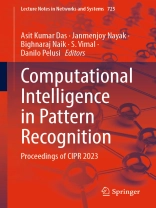This book features high-quality research papers presented at the 5th International Conference on Computational Intelligence in Pattern Recognition (CIPR 2023), held at Department of Computer Science and Engineering, Techno Main Salt Lake, West Bengal, India, during May 27–28, 2023. It includes practical development experiences in various areas of data analysis and pattern recognition, focusing on soft computing technologies, clustering and classification algorithms, rough set and fuzzy set theory, evolutionary computations, neural science and neural network systems, image processing, combinatorial pattern matching, social network analysis, audio and video data analysis, data mining in dynamic environments, bioinformatics, hybrid computing, big data analytics, and deep learning. It also provides innovative solutions to the challenges in these areas and discusses recent developments.
สารบัญ
A New Technique of Cipher Type Identification using Convolutional Neural Networks.- Monthly Rainfall forecasting Using Sequential Models.- Detection and Classification of Dental Caries Using Deep and Transfer Learning.- Method Level Code Smells Detection Using Machine Learning Models.- Performance Investıgatıon of Svm and Modıfıed Svm Algorıthms for Acute Health Dıagnosıs.- An Efficient Multifactor Authentication System.- A CNN based approach for Face Recognition under dif-ferent orientations.- A Deep Learning Approach for Detection of Disease in Plant Leaves.- Label Consistency based Modified Sequential Dictionary Learning based Approach for PIR Sensor based Detection of Human Movement Direction.- Machine Learning Based Phishing Detection in Heterogeneous Information Network.
เกี่ยวกับผู้แต่ง
Asit Kumar Das is working as Professor in the Department of Computer Science and Technology, Indian Institute of Engineering Science and Technology, Shibpur, Howrah, West Bengal, India. He has published more than 150 research papers in various international journals and conferences, 3 books, and 6 chapters. He has worked as Member of the Editorial/Reviewer Board of various international journals and conferences. He has shared his research field of interest in many workshops and conferences through his invited speech in various institutes in India. He acts as General Chair, Program Chair, and Advisory Member of committees of many international conferences. He has more than twenty years of teaching experience in the field of Computer Science and Technology. His research interest includes machine learning and pattern recognition in various fields including bioinformatics, social networks, text mining, audio and video data analysis, and medical data analysis. He has already guided ten Ph.D. scholars and is currently guiding six Ph.D. scholars.
Janmenjoy Nayak is working as Assistant Professor, P.G. Dept. of Computer Science, Maharaja Sriram Chandra Bhanja Deo (MSCB) University, Baripada, Odisha, India. He has published more than 210+ research papers in various reputed peer-reviewed referred journals, international conferences, and chapters. Being two times Gold Medalist in Computer Science in his career, he has been awarded with INSPIRE Research Fellowship from Department of Science & Technology, Govt. of India (both as JRF and SRF level) and Best Researcher Award from Jawaharlal Nehru University of Technology, Kakinada, Andhra Pradesh, for the AY: 2018-19, and many more awards to his credit. He has edited 20+ books and 15+ special issues in various topics including data science, machine learning, and soft computing with reputed international publishers like Springer, Elsevier, Inderscience, etc. His area of interest includes data mining, nature-inspired algorithms, and soft computing.
Bighnaraj Naik is Assistant Professor in the Department of Computer Applications, Veer Surendra Sai University of Technology, Burla, Odisha, India. He received his Doctoral degree from the Department of Computer Science Engineering and Information Technology, Veer Surendra Sai University of Technology, Burla, Odisha, India, Master’s degree from SOA University, Bhubaneswar, Odisha, India, and Bachelor’s degree from National Institute of Science and Technology, Berhampur, Odisha, India. He has published more than 190+ research papers in various reputed peer-reviewed international conferences, referred journals, and chapters. He has more than ten years of teaching experience in the field of Computer Science and Information Technology. His area of interest includes data mining, soft computing, etc. Currently, he is guiding four Ph.D. scholars and six master students.
Vimal Shanmuganathan is working as Associate Professor in the Dept of Artificial Intelligence and Data Science, Ramco Institute of Technology, Tamil Nadu, India. He received Ph.D. degree in Cognitive Radio Networking and Security Techniques using AI from Anna University, Chennai, Tamil Nadu. He is working as Associate Professor in the Department of Computer Science and Engineering, Ramco Institute of Technology, Tamil Nadu, India. His areas of interest include game modeling, artificial intelligence, cognitive radio networks, and network security. He has published around 80 papers. He has hosted 21 special issues in IEEE, Elsevier, Springer, and CMC Tech Science journals. Danilo Pelusi received the degree in Physics from the University of Bologna (Italy) and the Ph.D. degree in Computational Astrophysics from the University of Teramo (Italy). Currently, he is Associate Professor of Computer Science at the Department of Communication Sciences, University of Teramo. Editor of Springer and Elsevier books, and Associate Editor of IEEE Transactions on Emerging Topics in Computational Intelligence (2017-2020), IEEE Access (2018-present) and IEEE Transactions on Neural Networks and Learning Systems (2022-present), IEEE Transactions on Intelligent Transportation Systems (2022-present), he is Guest Editor for Elsevier, Springer, MDPI, and Hindawi journals. Keynote Speaker, Guest of Honor, and Chair of IEEE conferences, he is Inventor of international patents on artificial intelligence. His research interests include fuzzy logic, neural networks, information theory, machine learning, and evolutionary algorithms.












